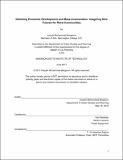| dc.contributor.advisor | Karl Seidman. | en_US |
| dc.contributor.author | Bergeron, Insiyah Mohammad | en_US |
| dc.contributor.other | Massachusetts Institute of Technology. Department of Urban Studies and Planning. | en_US |
| dc.date.accessioned | 2017-09-15T14:21:44Z | |
| dc.date.available | 2017-09-15T14:21:44Z | |
| dc.date.copyright | 2017 | en_US |
| dc.date.issued | 2017 | en_US |
| dc.identifier.uri | http://hdl.handle.net/1721.1/111260 | |
| dc.description | Thesis: M.C.P., Massachusetts Institute of Technology, Department of Urban Studies and Planning, 2017. | en_US |
| dc.description | This electronic version was submitted by the student author. The certified thesis is available in the Institute Archives and Special Collections. | en_US |
| dc.description | Cataloged from student-submitted PDF version of thesis. | en_US |
| dc.description | Includes bibliographical references (pages 71-75). | en_US |
| dc.description.abstract | Until recently, prisons were considered an economic development strategy particularly in rural communities struggling with the loss of manufacturing jobs. However, many studies have shown that prisons often have weak linkages to the host community, and sometimes have negligible or even negative impacts on rural economies. A combination of factors including changing sentencing laws, inadequate conditions in older facilities, fiscal conservatism, and increasing reliance on community based alternatives to incarceration are now leading to prison closures all around the country. In this changing context, this thesis explores: (i) What are the real and perceived impacts of prison closures on local economies in small rural counties?; and (ii) Where communities are redeveloping old prisons to boost their economies, how are local needs, politics, and project constraints (related to design and finance) shaping the transformation of these sites? By focusing on two cases where former prisons are being reused for community and economic development, this thesis explores how rural communities might transition to new ways of employing people and generating wealth after a local prison closes. | en_US |
| dc.description.statementofresponsibility | by Insiyah Mohammad Bergeron. | en_US |
| dc.format.extent | 75 pages | en_US |
| dc.language.iso | eng | en_US |
| dc.publisher | Massachusetts Institute of Technology | en_US |
| dc.rights | MIT theses are protected by copyright. They may be viewed, downloaded, or printed from this source but further reproduction or distribution in any format is prohibited without written permission. | en_US |
| dc.rights.uri | http://dspace.mit.edu/handle/1721.1/7582 | en_US |
| dc.subject | Urban Studies and Planning. | en_US |
| dc.title | Delinking economic development and mass incarceration : imagining new futures for rural communities | en_US |
| dc.title.alternative | Imagining new futures for rural communities | en_US |
| dc.type | Thesis | en_US |
| dc.description.degree | M.C.P. | en_US |
| dc.contributor.department | Massachusetts Institute of Technology. Department of Urban Studies and Planning | |
| dc.identifier.oclc | 1003291391 | en_US |
